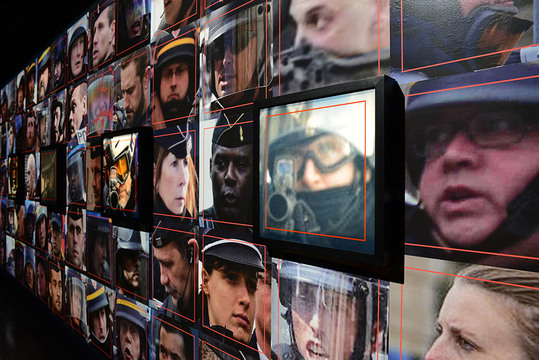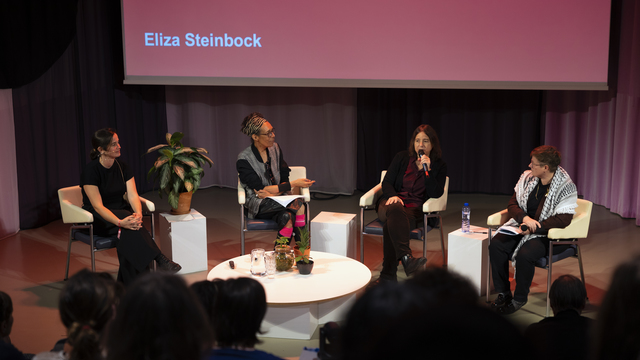Search results for 'biopolitics'
The Becoming Environmental of Power: Tactical Media After Control - Part II
There is a last enterprise that might be undertaken. It would be to seek experience at its source, or rather, above that decisive turn where, taking a bias in the direction of our utility, it becomes properly human experience. (Bergson, 1991: 184).
ReadREALLY? - Art and Knowledge in Time of Crisis
Opening on 22 June 2024 at Framer Framed, the exhibition Really? Art and Knowledge in Time of Crisis highlights the ways in which the scientific disciplines – historically associated with truth-telling – are increasingly used by cynical actors of big corporations and rogue governments alike to obscure, mislead and effectively capitalise and weaponise ignorance. The exhibition is curated by David Garcia and Mi You.
Stranded
When thinking about dead bodies on the beach, these days most people think of refugees whose boats sank during the dangerous sea crossing to the European Union. The number of refugees drowned in the Mediterranean Sea in 2015 is the highest ever, reaching 2,500. The killing of these men and women can effectively be seen as a direct – and deliberate – act of EU policy, making the border between Northern Africa and Europe the deadliest in the world.
The photographic series "Stranded" shows men lying motionless on an empty beach. But unlike refugees these men wear business suits, the standardized clothing of politicians and managers. Their bodies are partly in the water, partly on the beach; they appear to be stranded.
Occupy Monsanto
This is a Call to Action for a
Non-Hierarchical Occupation of Monsanto Everywhere
Whether
you like it or not, chances are Monsanto contaminated the food you ate
today with chemicals and GMOs. Monsanto controls much of the world's
food supply at the expense of food democracy worldwide. This site is
dedicated to empowering citizens of the world to take action against
Monsanto during the week of September 17th, 2012.
Dawn of the Organised Networks
At first glance the concept of "organised networks" appears oxymoronic. In technical terms, all networks are organised. There are founders, administrators, moderators and active members who all take up roles. Think also back to the early work on cybernetics and the "second order" cybernetics of Bateson and others. Networks consist of mobile relations whose arrangement at any particular time is shaped by the "constitutive outside" of feedback or noise.[1] The order of networks is made up of a continuum of relations governed by interests, passions, affects and pragmatic necessities of different actors. The network of relations is never static, but this is not to be mistaken for some kind of perpetual fluidity. Ephemerality is not a condition to celebrate for those wishing to function as political agents.
ReadThe Becoming Environmental of Power: Tactical Media After Control - Part I
There is a last enterprise that might be undertaken. It would be to seek
experience at its source, or rather, above that decisive turn where,
taking a bias in the direction of our utility, it becomes properly human
experience. (Bergson, 1991: 184).
The Corona Reboot
An attempt to provisionally theorize the emergence of new subjectivities in the early stages of the coronavirus pandemic.
ReadTen Premises For A Pandemic
How much has changed in just a few days. Here is another text I've composed in an attempt to continue to think about the pandemic, and our lives within it. I hope it's of use, however minorly, as we all try to come to some kind of terms with the novel transformations, precarities, and struggles emerging in every direction.
~i
Governmentality of Information
The American military network ARPAnet was conceived as a way to maintain uninterrupted communications in the event of nuclear war. Ancestor of the Internet and foundation of the Global Information Infrastructure, ARPAnet springs from exactly the same source as the "pushbutton war" that lay behind it: the change of scale provoked by the early 20th century discoveries in physics, within an industrial society capable of organizing the productivity - including the scientific productivity - of thousands of agents. Here, no doubt, is the real birthplace of the information society: a society massively penetrated by the sciences and technologies of information and telecommunications, using them to carry out the design of the planet or at least, that of its components (with design replacing politics). A society whose governmentality entails the knowledge of the real, that is to say, the transformation of reality into information. A society whose governmentality unfolds between its smallest common denominators (atomic, electronic, magnetic, genetic, chemical) and its largest common denominators (climate, planet, solar system), by way of laws, formulas and norms that determine its productivity, means, and possible destinies.
Read

